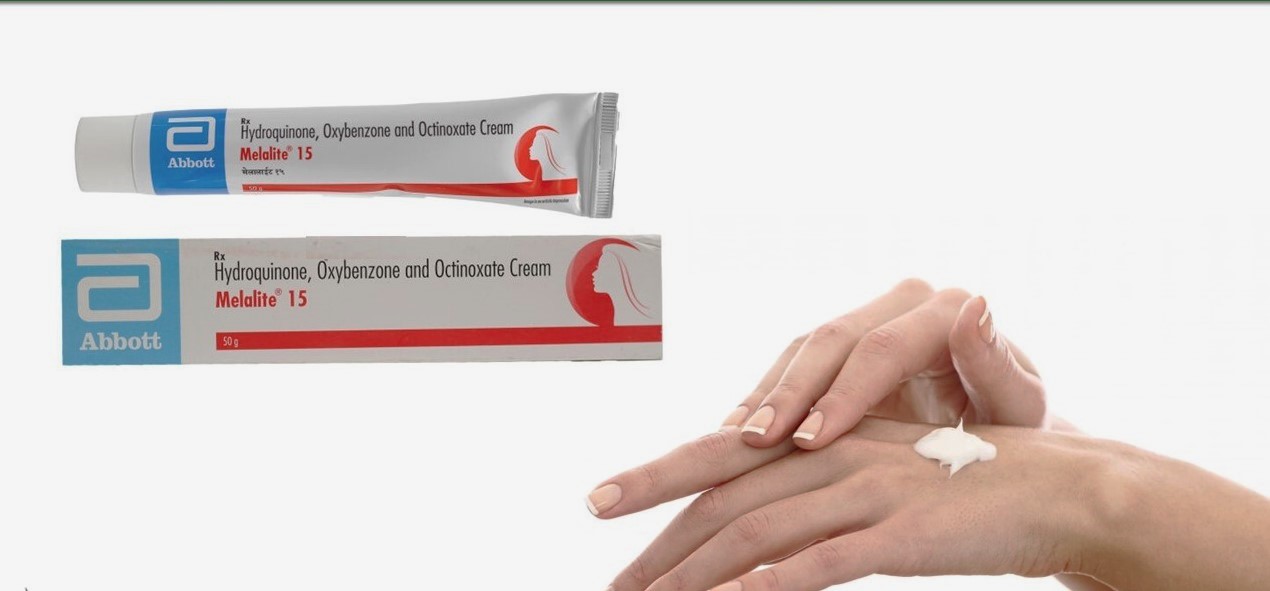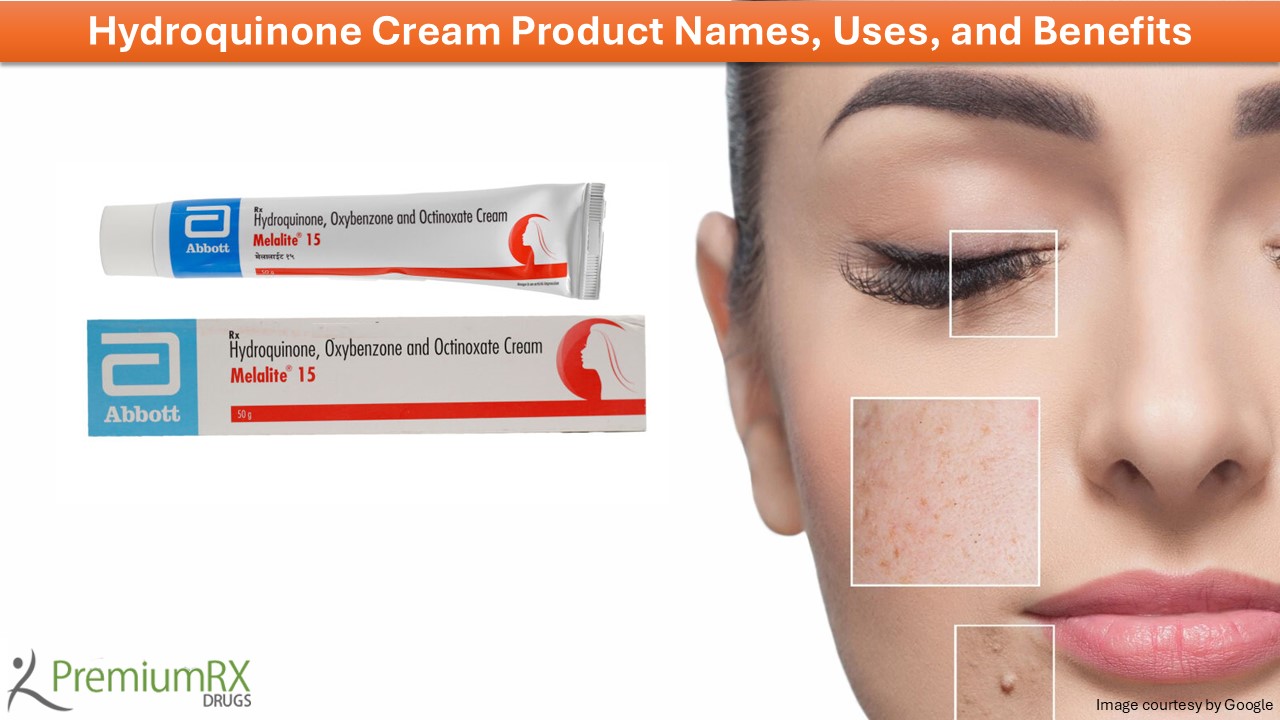Hydroquinone cream is a topical skin treatment used primarily to lighten hyperpigmentation areas. It is commonly used to treat skin conditions, including melasma, dark spots, freckles, and PIH (post-inflammatory hyperpigmentation). Let’s understand about these skin conditions:
- Melasma: This skin condition causes brown or grayish-brown patches, often on the face. It is more common in women than men. Pregnancy and hormonal changes are common causes of melasma, but UV rays can also cause it.
- Dark spots usually occur due to sun damage, age, or acne scars. Prolonged sun rays trigger melanin production, which causes dark spots, especially on the face and neck.
- Freckles: Sun exposure and genetics cause face freckles. These are small brown or red color spots caused by melanin. Hydroquinone helps lighten these freckles.
- Post-inflammatory hyperpigmentation (PIH): Dark spots occur after an inflammatory skin condition like acne or eczema.
How does Hydroquinone cream work?
Hydroquinone works by inhibiting the enzyme tyrosinase, essential to producing melanin (the pigment that gives skin its color). By reducing melanin production, hydroquinone lightens skin-darkened areas over time. It is a topical formulation and should be used when your doctor recommends it. Following prescription steps increases the chances of faster recovery.
Strengths and different brands of hydroquinone cream
Hydroquinone creams are available in different concentrations, usually between 2% and 4%. It is typically applied once or twice daily to the affected areas to treat the skin condition. Hydroquinone cream comes in different brands and generic options. The working efficiency of brand and generic products is similar in terms of delivering results. For savings, people choose generic options over brands. Hydroquinone comes in single and combination formulations. Your doctor will identify the best option for your skin condition.
Some common selling options of hydroquinone formulations include Melalite Forte cream, A Ret-HC cream, Skin Lite cream, Clearz Max cream, Melamet cream, LustraAF, Melquin HP, and many more. Some of these products are combination formulations.
Hydroquinone cream benefits
Hydroquinone cream offers several benefits, especially for those struggling with hyperpigmentation and uneven skin tone when followed per regimen. Some key benefits of this cream include:
- Reduces hyperpigmentation
Hydroquinone is highly effective in lightening dark spots caused by excess melanin production. It treats melasma, sun spots, aging spots, acne scars (post-inflammatory hyperpigmentation)
- Improves skin tone
By lightening and reducing dark patches, hydroquinone cream helps even out overall skin complexion, leading to a more uniform skin tone.
- Fast and visible results
When used correctly and consistently, depending on the severity of the condition, visible improvements in skin tone and a reduction in dark spots can usually be seen within 4-6 weeks of regular usage.
- Minimal invasive treatment
Hydroquinone offers a non-invasive solution to skin pigmentation issues compared to laser therapies or chemical peels.
- Suitable for various skin conditions
Hydroquinone is widely used to treat various pigmentation disorders, including freckles, liver spots, and chloasma (a skin condition during pregnancy).
- Easy to use
Hydroquinone cream is an easy-to-use topical formulation. Anyone can easily apply this cream to the affected areas to treat skin concerns.
- Boosts self-esteem
Reducing the appearance of dark spots and hyperpigmentation can significantly improve self-esteem and confidence for those with uneven skin tone or who struggle with dark facial spots.
- Easily available product
Hydroquinone can be easily purchased from medical stores and online pharmacies. It costs reasonably compared to other treatment options.
To maximize hydroquinone cream’s benefits, it is essential to follow the prescribed regimen and pair it with good sun protection, as the skin becomes more photosensitive during treatment.
Treatment duration
Hydroquinone is generally used as a short-term treatment lasting 3-4 months. After that, a break is recommended to prevent potential side effects.
Always consult a dermatologist before starting Melalite forte Cream, especially if using a stronger concentration or combining it with other skin treatments.
Hydroquinone usage instructions:
This formulation is for external use only. Read the instructions on the label in the pack. Apply a sufficient amount to the affected skin area to treat the condition. The Melalite forte Cream should not be applied near the eye, nose, and mouth; if it accidentally gets into these areas, wash it thoroughly with water.
Before applying, wash your hands and affected skin area and pat it dry with a soft towel. Take a peo-sie cream and evenly apply it to the affected skin; now, gently rub it until the cream gets observed by the skin. Do not use more than the prescribed quantity; extra cream can irritate the skin badly. Also, hydroquinone cream should not be used on broken or wounded skin. Also, do not forget to inform your doctor if you are using other topical formulations (these include prescribed and non-prescribed) to avoid side effects and drug interactions.
Possible side effects of hydroquinone cream
Hydroquinone cream is largely safe for most people, but few may experience certain side effects, and these include as follows:
- Skin irritation: Redness, dryness, or mild burning sensations can occur.
- Ochronosis: Prolonged use, especially in higher concentrations, can lead to ochronosis, which causes the skin to become darkened and thick.
- Sensitivity to sun: Hydroquinone can make the skin more sensitive to sunlight, so sunscreen use is highly recommended.
- Skin dryness and flakiness
- Other allergic reactions
Hydroquinone cream should be used with caution when prescribed. Follow the application instructions carefully to minimize side effects.
Marie
Latest posts by Marie (see all)
- Eptoin 50mg Uses, Precautions and Side Effects - July 1, 2025
- Eyelash Goals Unlocked: Why Careprost Is the Ultimate Solution. - June 30, 2025
- Clopidogrel 75mg : Uses, Dosage, Side Effects, Interactions & More - June 30, 2025




